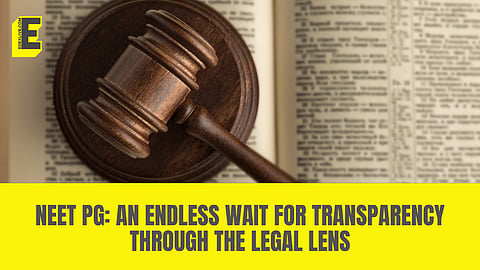
- News
- Campus
- Exam
- Podcast
- Web Stories
- Do You Know
- Path Finders - UG Programs
- Videos
- Élitscape

In yet another setback for medical aspirants, the Supreme Court has postponed today's (May 20) scheduled hearing of multiple petitions challenging the NEET-PG examination's two-shift format and transparency concerns.
As the June 15 examination date rapidly approaches, thousands of candidates find themselves suspended in uncertainty while legal battles that began years ago continue their slow march through the judicial system.
The deferment came as the bench prioritised ongoing arguments in the Waqf case, presented by senior advocate Kapil Sibal. The petitions have now been rescheduled for hearing later this week, with conflicting reports suggesting either May 22 or May 23 as the new date.
A never-ending cycle of legal challenges
Year after year, medical students approach the courts seeking redressal for what they consider fundamental issues with the National Eligibility cum Entrance Test - Postgraduate (NEET PG). The concerns remain largely unchanged: lack of transparency, questionable evaluation methods, and now, the controversial two-shift format.
The current petitions, including those filed by Dr Ishika Jain, the United Doctors' Front (UDF), and Dr Aditi, have already faced multiple postponements. Some related cases have been pending since 2021, creating a complex legal web that has yet to be untangled.
A process that takes time
Advocate Tanvi Dubey, representing petitioners in few petitions challenging the said cause, defends the judicial process while acknowledging the delays.
"It cannot be said that cases are derailed without a judgment every year. That would be too much of a generalisation," Dubey told EdexLive. "There are cases in which the court has gone out of its way to hear matters and deliver orders urgently."
She explained that the current case is part of a larger batch of petitions dating back several years: "There's a batch of petitions which are pending from 2021. Ayush Patel was the main case, along with Manjunath and Ayush Patel, which raised questions about NEET-PG transparency. In that particular case, there were certain other petitions related to AIIMS that were pending even before that."
Dubey emphasised that the court follows a structured process that requires hearing from all parties involved. "From a layman's perspective, they may want the court to decide the issue the same day. But that may not be a feasible approach because judges need to hear the other side, too. Basic principles of natural justice come into play here."
She highlighted that the transparency issue is particularly complex because it addresses fundamental reforms in the examination system.
"This is an extremely important issue that affects both present candidates and future aspirants of NEET PG. This will yield a very comprehensive judgment. It will take time, but it's not being delayed without reason. There will likely be a better outcome from this judgment," she explained.
A complete lack of transparency
Advocate Satyam Singh Rajput, representing the United Doctors' Front, takes a more critical stance on the NBE's approach to these examinations.
"I do not have any problem with the normalisation process or with NEET PG itself. But where is the transparency?" Rajput questioned. "They do not disclose the questions or the answer sheets. We are not aware of how they are calculating scores. Students do not have the right to review their own questions."
He criticised the NBE's justification that 95% attendance for last year's exam indicates the success of the current system. "This is completely absurd. Even if students do not get relief from the court, they will still have to appear for the same exam. They have no other option after preparing for two or three years," he says.
Rajput pointed out that the normalisation formula being used was adopted from AIIMS Delhi but has already been discarded by that institution. "Now they are opting for that same formula for both 2024 and 2025 examinations. How is that possible?"
Fundamental Rights at stake
Both lawyers agree that the issues extend beyond mere administrative procedures to violations of fundamental constitutional rights.
"This involves a violation of fundamental rights of the Constitution, but also represents a technical violation," said Rajput. "In essence, students do not have the right to judicial review. They do not have enough information to properly examine the evaluation process. There is simply no mechanism for transparency."
Dubey noted that these cases have significant implications for the entire medical education system. "This affects all present candidates as well as future aspirants of NEET PG. The court is aware that this pertains to a crucial examination that will determine the professional futures of thousands."
Systemic problems persist
The ongoing legal battles reflect deeper systemic issues with the conduct of national-level examinations in India. What was witnessed in 2024 was a nightmare for the entire medical fraternity, and 2025, with its exam date approaching, faces similar daunting clouds, apprehensions, and dissatisfaction.
"There is a huge lacuna in the system. If you look back at the past four years, virtually every exam conducted by the government has faced similar issues. This pattern itself is very questionable," Rajput observed.
As the Supreme Court prepares to hear these cases later this week, the fundamental question remains: Will this time bring meaningful change, or will medical aspirants continue to face the same cycle of delays, postponements, and ultimately, unchanged examination processes?
